Apple’s Compromises with the Kremlin
The Russian government’s digital authoritarianism is currently one of the most severe in the world, only matched by that of military regimes such as in Myanmar or repressive governments in Pakistan, Sudan, Saudi Arabia and one-party dictatorships such as Vietnam and China. The Kremlin’s current censorship policies are the result of more than a decade-long accumulation of repressive legislation and sustained efforts to control information by suppressing any dissenting voices within the country’s borders.
Recently, the Russian government has focused efforts on exerting control over foreign Big Tech companies. These efforts were translated into numerous legislative reforms including new laws: defining critical content as illegal, making tech companies responsible for the content they host, and new regulations requiring foreign companies set up ‘representative offices’.
Russia Censorship Policies
Following Putin’s return to this presidential status in 2012, the Kremlin began experimenting with new approaches to information manipulation and control that differed significantly from the often-compared Chinese ‘Great Firewall’ system. The Russian government pioneered a distinct model of censorship relying on less overt and more plausibly deniable, legalistic, and often non-technical mechanisms to manipulate online information flows, narratives, and framings, to affect and shape public opinion without resorting to systematic, technical censorship. The leveraging of third-party botnets, independent hackers, contracted video-producers, and pro-regime bloggers in coordinated actions provides a further degree of deniability of government involvement. Bots, trolls, leaks of compromising or manipulated content, DDoS attacks causing temporary ‘technical failures,’ and other difficult-to-attribute techniques are combined with occasional legal prosecutions or site-blockages for exemplary offenders under vague laws and mass digital surveillance, creating an overall online environment which can still appear relatively unrestricted.

Timeline of Russian Information Control
The primary entity in charge of nationwide Russian digital censorship is a government agency named Roskomnadzor (RKN), that controls and supervises mass media (including electronic mass media), mass communications, information technology, and telecommunications. Other Russian government bodies may request that Roskomnadzor block sites that have content directly related to their scope of duty (a health agency may request to have health-related content blocked). However, Roskomnadzor itself is responsible for systematizing and maintaining a singular and centralized blocklist (known as the ‘single register’). The blocklist, first published in November 2012 and enforced by all Internet Service Providers (ISPs), is used for the censorship of individual URLs, domain names, and IP addresses.
Russia then continued to develop nationwide censorship policies on top of its ISPs-enabled censorship strategies. For example, in 2014 the Information Security Law was passed which imposed restrictions on social media users in Russia, including prohibiting ‘anonymous’ accounts. Human Rights Watch called the law “draconian” and “another milestone in Russia’s relentless crackdown on free expression.”
In 2019, Russia adopted its Sovereign Internet Law (also known as ‘Sovereign RUnet’ law) which required telecom operators to install ‘special equipment’ on their networks to protect against ‘external threats’ allowing the Kremlin to track, filter, and reroute traffic.
Russian authorities now routinely block access to sensitive political and social content and citing a range of justifications, Russian censors also restrict or attempt to restrict access to many social media and communication platforms. According to unofficial data, more than 4.74 million internet resources were blocked in Russia at the end of 2019.
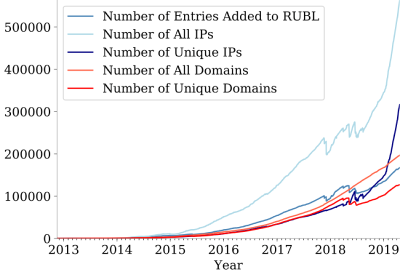
Evolution of the blocklist
The Russian government favors tools that make websites slow to load, instead of completely unreachable, a tactic which renders websites useless for distributing photos and video. It is more difficult for users to circumvent than old-fashioned methods of blocking sites, and it is more difficult for organizations that monitor and publicize cases of online censorship to detect.
“For the past decade, Russian authorities have used a web of vague laws and flimsy pretexts to intimidate and harass independent and dissenting voices,” said Hugh Williamson, Europe and Central Asia director at Human Rights Watch. “Now they are bluntly imposing censorship combined with a false narrative that they demand everyone must parrot.” All of this makes it more challenging to detect and workaround censorship.
Apple’s History with USSR & Russia
Apple’s History with Russia goes back to the Soviet Union. Steve Jobs visited the Soviet Union in 1985, allegedly in an effort to market Apple products in the USSR as well as to potentially establish a manufacturing facility to produce Apple computers in the Soviet Union. Jobs was accompanied by a commercial attaché from the U.S. Embassy in Moscow, who supervised the visit. Jobs and Apple’s then General Counsel & VP of marketing, Al Eisenstat, told the attaché about their plans to talk to Soviet politicians about the manufacturing plant & introduction of Apple products to the USSR.
Per RadioFreeEurope, the attaché “warned [Apple] this would violate massive numbers of export regulations aimed at keeping sophisticated technology out of the hands of the United States’ Cold War enemy.”
Apple did introduce its products within Russia in 1996 and Apple opened its first office in Russia in 2007. Apple used Russian companies to sell and promote its products in Russia from 1996-2008, then in 2008 transitioned to using a subsidiary and official distributors.
In 2009, Apple launched the iTunes Store in Russia, following an initial 2008 landing page that redirected to authorized resellers.
Former Russian President Dmitry Medvedev visited Apple’s headquarters in Cupertino and met with CEO Steve Jobs as part of a tour of Silicon Valley in 2010. Steve Jobs even gave the then-Russian President Dmitry Medvedev an iPhone 4 as a gift. Today, this visit is still memorialized on the Kremlin website. Medvedev visited Apple in Silicon Valley again in 2011, visiting a San Jose Apple retail store and meeting with Jobs.
In 2012, a Russian university announced a design competition to honor Steve Jobs. As a result, in 2013, an enormous iPhone was unveiled in St. Petersburg, Russia, as a tribute to former Apple CEO Steve Jobs. They also launched a website dedicated solely to celebrating Steve Jobs.
Apple began direct sales of Apple products in Russia in 2013, first with an online store, then later with brick & mortar retail stores. In 2016, Apple launched Apple Pay in Russia and has continued to expand its portfolio in the Russia market.
The Russian approach to information control attempts to undermine and marginalize the voices of opposition movements and leaders, while also shaping broader public opinion, through tactics like: surveillance, legal and extra-legal pressures, new forms of pro-regime content, mass-production and narrative manipulation, plausibly deniable cyberattacks, and hacking.
“The Russian government is using its growing technological capacity to engage in nontransparent, unlawful, and extrajudicial restriction of digital rights in Russia,” said Anastasiia Kruope, assistant Europe and Central Asia researcher at Human Rights Watch. “This past year’s [2021] dramatic crackdown on internet freedoms is the culmination of many years’ efforts by the authorities to restrict the rights and freedoms of Russians online.”
| Year | Law | Impact |
|---|---|---|
| 2014 | Information Security Law | Allows pre-court blocking of websites instigating riots, extremist or terrorist actions, thus extending the outreach of the original law fighting child pornography. This law has been actively used ever since to ask Facebook, YouTube and Twitter to remove or restrict access to content. |
| 2016 | Yarovaya Law | Requires telecom operators to store recordings of phone conversations, text messages and users’ internet traffic for up to 6 months, as well as metadata for up to 3 years. This data as well as “all other information necessary” is available to authorities on request and without a court order. |
| 2019 | Sovereign RuNet Law / Sovereign Internet Law | Compulsory installation of technical equipment for counteracting threats; Centralized management of telecommunication networks in case of a threat and a control mechanism for connection lines crossing the border of Russia; Implementation of a Russian national Domain Name System (DNS). |
| 2019 | Amendment to Article 4 of the Law of the Russian Federation “On the Protection of Consumer Rights” | Smartphones, computers and other smart devices purchased in Russia must come pre-installed with Russian software. Applied to a number of technology companies but sometimes reported in the media as the “Law against Apple.” |
| 2021 | Prohibited Content Law | Compels social media companies to coordinate their content moderation efforts with Roskomnadzor, which will develop a special e-service for that purpose. |
| 2021 | “Foreign Agent” Law | Enables authorities to target online media sharing of politically threatening content. |
| 2021 | The Landing Law | Requires websites with more than 500,000 daily users in Russia to open in-country offices by January 2022. |
| 2022 | Criminal Code, Article 207.3 | Criminalizes “public dissemination of knowingly false information disguised as truthful messages containing data about the use of the Armed Forces of the Russian Federation to protect the interests of the Russian Federation and its citizens, and uphold international peace and security, as well as data about the execution by state bodies of the Russian Federation of their authority beyond Russian borders for the same aims”. |
Russia’s Landing Law
Offline coercion in support of online censorship & surveillance
In June 2021, Russia adopted a law on foreign tech companies providing services to Russian users. The law requires websites with more than 500,000 daily users in Russia to open in-country offices by January 2022. Sanctions for noncompliance include banning the company from advertising or from using ads on their websites, restricting payments to the companies, and partial or full blocking of access to their websites.
According to Roskomnadzor, this law is applicable to 13 companies, including Google; Apple; Meta (including Facebook, Instagram, WhatsApp, and other companies); Twitter; TikTok; and Telegram. Roskomnadzor warned that the tech companies that violate the legislation risk facing advertising bans, data collection, money transfer restrictions, or could be completely denylisted.
The U.S. Department of State wrote that this kind of local representation affords Russian authorities leverage to enforce fines and regulations through pressure on domestically located employees. If tech companies do not comply, Roskomnadzor is authorized to block their access to Russian users’ personal data. The Washington Post called Putin’s Landing Law a “hostage law” because it demanded the world’s largest technology companies to keep employees in Russia and thus also exposed those employees to potential arrest or other punishment for their employers’ actions.
Barrons explained that internet control is not just about blocking content and filtering access to websites. Russia’s internet control model relies heavily on traditional, physical coercion, from intelligence service harassment to complex, confusing, and inconsistently enforced speech laws.
The Kremlin’s use of physical coercion was on stark display in the fall of 2021. Ahead of nationwide Russian elections, Russia’s internet censor demanded that Google and Apple delete an app made by opposition leader Alexey Navalny. Both companies—who had new, local offices per a recent law—initially refused. So, the Kremlin went after their employees.
The Russian parliament summoned Google company representatives to demand they delete the app and threaten punishment if they failed to comply—calling keeping the app up “election interference,” according to Russian news sites Meduza and the Moscow Times. Bailiff officers visited company offices to demand compliance, the Financial Times reported, and the Kremlin sent masked, armed thugs to hang around Google’s Moscow office. It was also recently revealed in the Washington Post that agents believed to be from the FSB, the successor security service to the Soviet-era KGB, showed up at the home of Google’s top executive in Russia and told her she would be imprisoned in 24 hours if nothing was done. After her security team moved her to a hotel, the agents followed the person there to repeat the warning. Sure enough, both companies deleted the app. The U.S. government made no comment on the blatant pressure tactics. Apple and Google did not directly respond to the Washington Post or Financial Times about their findings.
“You can’t talk about Moscow’s shaping and suppression of information without discussing the ‘economy of terror.’”
– Russian-American journalist Masha Gessen
iCensorship
In recent years, Apple has acquiesced to the Russian government in a number of censorship, surveillance, and information manipulation requests. From 2018 until 2022, Apple compliance with the Kremlin’s requests seems to be increasing year over year. If Apple’s compliance with requests for censorship is best illustrated by cases of app removals from the iOS App Store, Russia’s innovative and extensive oppression has also led to censorship within software (LGBTQ+ watch faces), accessories (LGBTQ+ watch bands), software-based cartography (Crimea), protocols (Private Relay), and even the design of iOS (Russian iOS).
These instances where the censorship was identified and reported by users, developers, reporters, or organizations begin to show us how pervasive the extent of Apple’s censorship for Russia may be. In addition to demands by the Russian government for apps to be removed from the iOS App Store (Russia’s App Store only, or in cases of Platform Policy Takedown Requests), the Russian government may surveil, throttle, or otherwise interfere with access to and usage of those apps.
The Russian government’s intimidation tactics may also chill those using an iPhone with a Russian profile, and those people may be the only ones to witness some of the Kremlin’s more aggressive moves (like Apple’s configuration of Apple Maps for Russia to show Crimea as part of Russia). There may be much censorship we do not yet know about, either because it is happening in the shadows or because those who see it are too afraid to report it. Thus, the instances we do know about should be taken with great weight as witnessing the ‘smoke’ for a larger fire.
Apple Pride Watch Face & Strap (2018)
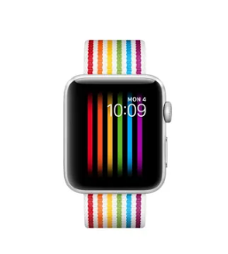
Apple Pride Watch Face & Strap
Among all sensitive topics in Russia, topics related to the LGBTQ+ community best embodies Apple’s hypocrisy and double standards practiced in Russia. Starting in at least 2016, Apple has made numerous controversial decisions related to the LGBTQ+ community. This exposed the insincerity of Apple’s self-proclaimed support for LGBTQ+ rights and Apple’s inclination to sacrifice its supposed principles in order to enhance its business and financial position. Russia has enacted numerous draconian and discriminatory laws in recent years, resulting in a deterioration of human rights in the country. Russia implemented a “gay propaganda” law in 2013, which per the European Court of Human Rights, reinforces prejudice and encourages homophobia. The law enables threats of fines and jail time for ‘offensive’ speech. Online intimidation and physical violence against LGBTQ+ people also escalated following the adoption of the law.
The Apple Watch pride face is hardcoded to not show up if the paired iPhone is using the Russian locale pic.twitter.com/vEP8XquYsP
— Guilherme Rambo (@_inside) August 31, 2018
In January 2014, a coalition of over 15 Russian LGBTQ+ organizations encouraged Apple to stop business dealings with Euroset, a Russian mobile phone retailer, following news that Euroset’s creative director said he wanted to shove all gay people “alive into an oven,” compared homosexuality to fascism, and declared it an “overt sign of mental abnormality.” The letter called on Tim Cook to “set Apple as an example of a corporate citizen who supports basic human rights.” However, Apple was still partnering with Euroset to sell its products in Russia until at least 2016. The homophobic director did resign from Euroset following the backlash.
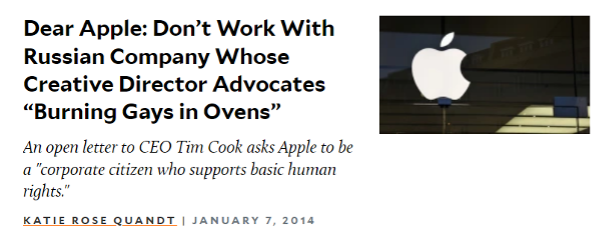
After Tim Cook came out as gay in 2015, there was an anti-LGBTQ+ response in Russia. Previously, a coalition of companies (ZEFS) had erected a monument (which looked like a massive iPhone) to honor Steve Jobs in 2013. After Tim Cook came out, ZEFS then took down the monument and said because Tim Cook came out as gay, the monument “violated Russia’s laws.”
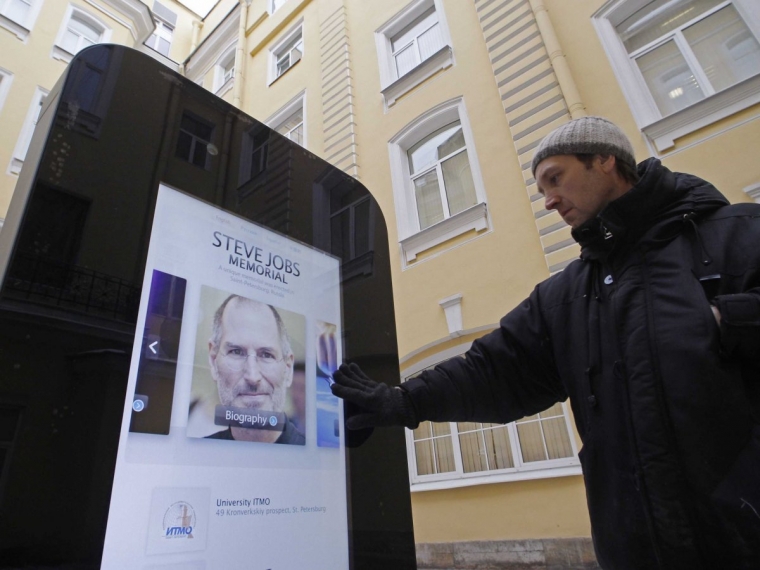
Steve Jobs Memorial in Russia
Vitaly Milonov, a member of the ruling United Russia party who sits on St. Petersburg’s legislative assembly and the architect of what is known as Russia’s “gay propaganda” law, has called for Apple’s CEO to be barred entrance to Russia (persona non grata). “What can he bring us? The Ebola virus, AIDS, gonorrhea? All of them over there have promiscuous relations. Ban him forever,” Milonov said.
In 2015, it was exposed that the Russian language version of Siri, Apple’s voice-controlled virtual assistant, provided homophobic answers to queries relating to LGBTQ+ topics. The allegations first came to light when a Russian man uploaded a video to YouTube appearing to show Siri either evading questions or expressing a negative response. When contacted by the Guardian, Apple refused to give further comment, replying with a single sentence saying only that Siri’s responses had been “fixed”.
In 2018, The Verge reported that Apple’s special Pride (LGBTQ+) edition Apple Watch strap was not available in Russia. Fast Company called the censorship “shocking.” The Verge also reported that Reddit users and Apple support forum users had also been questioning the lack of a Pride watch face in Russia for several months.
iOS developer Guilherme Rambo found evidence that the Pride Apple Watch face was “hardcoded to not show up if the paired iPhone is using the Russian locale.” The Verge tested this on an iPhone and the pride watch face disappeared once the iPhone was switched to the Russian locale.
As Apple complied with the Kremlin’s demands, Google made efforts to resist Russia’s discriminatory laws. Google even promoted LGBTQ+ rights during the 2014 Winter Games in Russia. The Google homepage globally displayed a rainbow-inspired Google Doodle and the Olympic Charter, which called for the Olympic spirit of “no discrimination of any kind against every individual practicing sport.”
Between mid-2016 and mid-2020, 32 different LGBTQ+ websites were blocked at least once on Russian internet providers. “News websites on LGBTQ+ related topics were most commonly blocked, followed by cultural and human rights sites,” said the report published by OutRight Action International, the University of Toronto’s Citizen Lab and the Open Observatory of Network Interference (OONI) in 2021. That year, Russia had the highest number of networks that block LGBTQ+ URLs with a Citizen Lab study detecting the blocking of LGBTQ+ websites on 172 distinct Autonomous System (AS) networks.
Apple’s acquiescence to the Russian government has only strengthened Russia’s anti-LGBTQ views and discriminatory process. Further, there is no record of Apple ever opposing or protesting the Russian government’s derogatory comments towards Tim Cook.
Apple Maps & Crimea (2019)
Apple also submitted to geopolitical requests from the Kremlin, including altering cartography related to disputed territories which quickly instigated international outcry.
Russian forces annexed Crimea from Ukraine in March 2014, drawing international condemnation. In January 2015, U.S. President Obama ordered sanctions that targeted Crimea, including banning US-based online services like Amazon, PayPal, and Apple’s App Store from operating in the disputed peninsula. Apple also banned sales of its products in Crimea and blocked accounts of Crimean producers from distributing through the iTunes Store, removed published apps from all App Store if the developers were in Crimea, and blocked internal accounts from sending or receiving money if they were in Crimea.
After Russia’s invasion, Apple modified its maps to show Crimea as “disputed territory” to all of its users. Then in November 2019, Apple updated Apple Maps within Russia to show Crimea as part of Russia. The BBC reported that Apple complied with Russian demands to show the annexed Crimean Peninsula as part of Russian territory on its apps. A member of the Russian government claimed Apple had complied with the Russian constitution. He said representatives of Apple were “reminded” that labeling Crimea as part of Ukrainian territory was a criminal offense under Russian law.
Just checked on my phone, it's true!
— Will Vernon (@BBCWillVernon) November 27, 2019
=
Apple has complied with Moscow’s demands to show Crimea, annexed from Ukraine in 2014, as Russian territory. Crimea & the cities of Sevastopol & Simferopol are now displayed as Rus. territory on Apple’s map & weather apps when used in Russia
IPhones are great products. Seriously, though, @Apple, please, please, stick to high-tech and entertainment. Global politics is not your strong side. #CrimeaIsUkraine
— Vadym Prystaiko (@VPrystaiko) November 27, 2019
Ukraine denounced Apple for referring to the annexed Crimean Peninsula as a Russian territory on its apps. “Let me explain in your terms, Apple,” Ukraine’s Foreign Minister Vadym Prystaiko said via Twitter in November 2019. “Imagine you’re crying out that your design and ideas, years of work and piece of your heart are stolen by your worst enemy but then smb ignorant doesn’t give a damn about your pain. That’s how it feels when you call Crimea a (Russian) land.”
Former world chess champion Garry Kasparov suggested Apple’s decision to change its maps inside Crimea to make it appear as part of Russia constituted “a huge scandal.”
“American tech companies should stand up for the values of innovation that made their success possible, not bow down to dictators for a little extra cash they don’t even need,” Kasparov said.
Vadym Prystaiko, Ukraine’s foreign minister, wrote: “iPhones are great products. Seriously, though, @Apple, please, please, stick to high-tech and entertainment. Global politics is not your strong side. #CrimeaIsUkraine.”
Soon after Putin’s war on Ukraine began in 2022, Apple apparently changed its Apple Maps display for users not in Russia to show Crimea as part of Ukraine—rather than a disputed territory as previously depicted. Apple has repeatedly refused to comment on its current policy for users opening Apple Maps within Russia.
Apple’s Russia iOS (2019)
Apple has also been very secretive about another software modification it made for Russia in recent years, on its Russian version of its iOS installed in all Apple devices sold in the country.
Here is how it looks in the actual setup. pic.twitter.com/QOUwwIGSnx
— Khaos Tian (@KhaosT) April 1, 2021
In November 2019, Russian parliament passed a law requiring all mobile devices to preload a selection of applications from Russian developers as part of activation screens for new devices.
The pre-installed apps law became colloquially known as the “law against Apple” in Russia, as apparently Apple had threatened to leave Russian market, when confronted with the request to change the rules of its walled-garden ecosystem in the country. Apple eventually conceded, stayed in Russia, and is now shipping a Russian-version of its iOS.
The Washington Post reported in March 2021, that Apple began configuring iPhones sold in Russia to promote Kremlin-backed social media companies, enabling users to activate them with a single click. It was a concession that advanced Putin’s goal of migrating Russian people to platforms controlled by the Russian government.
Apple’s decision baffled Russian analysts. “What is the reason at this point to accommodate the Russian government?” asked Sergey Sanovich, a postdoctoral scholar at Princeton University tracking the Kremlin crackdown. “I’m not sure what [Apple] has in Russia that they are trying to protect at this point.”
In April 2021, The Verge reported Apple’s Russia iPhones saying in the set-up screen, “In compliance with Russian legal requirements, continue to view available apps to download,” before showing a short list of just shy of a dozen apps. These include various Yandex apps, the email app from Mail.ru, a video live-streaming service called OK Live, and popular Russian social network VK.
Apple’s decision to bend its rules on pre-installed apps in Russia emboldened its government to continue making more demands, including blocking privacy features in the region, such as Private Relay. It may also inspire other repressive regimes to make similar demands in the future.
Ah looks like the Russia App Store thing is live now pic.twitter.com/zxz4GgQeoW
— Khaos Tian (@KhaosT) April 1, 2021
Private Relay (2021)
In September 2021, Apple blocked Russian user’s access to its new security tool, Private Relay, that could have helped Russians reach foreign news coverage and other content deemed ‘illegal’ by the government. The feature, designed to prevent websites and network providers from creating detailed user profiles and identifying users, comes pre-installed on new phones in the United States and some other markets. The service hides users’ IP addresses and browsing activity and protects their unencrypted web traffic.
Apple initially offered the service in Russia, but those who tried to activate it in Russia later received a message saying that the program was ‘not supported’ in that country. The company had initially decided to not release Private Relay in ten countries, including China, Belarus, Colombia, Egypt, Kazakhstan, Saudi Arabia, South Africa, Turkmenistan, Uganda, and the Philippines.
Hey, @Apple! Turn on Private Relay for Russia (preferably, by default and for free). Don't help the Russian government conceal the atrocities of the war against Ukraine from the Russian people. Don't facilitate censorship, help people access unfiltered news. pic.twitter.com/Cf6AsnknVO
— Sergey Sanovich (@SergeySanovich) March 8, 2022
Government Requests for User Data
Apple has also been increasingly compliant in handing over user data to the Kremlin per Apple’s own ‘Government Requests’ reporting. Apple not only tells on itself by the data itself, but Apple also makes it clear they know their actions would invite public controversy with Apple’s opaque and misleading presentation of the data.
When looking at Apple’s data directly on its website, visualization of the data gives the misleading impression that the requests have decreased over the years when in fact the number of requests by the Russian government have significantly increased, for all types of data requests (i.e. device, account and financial data).
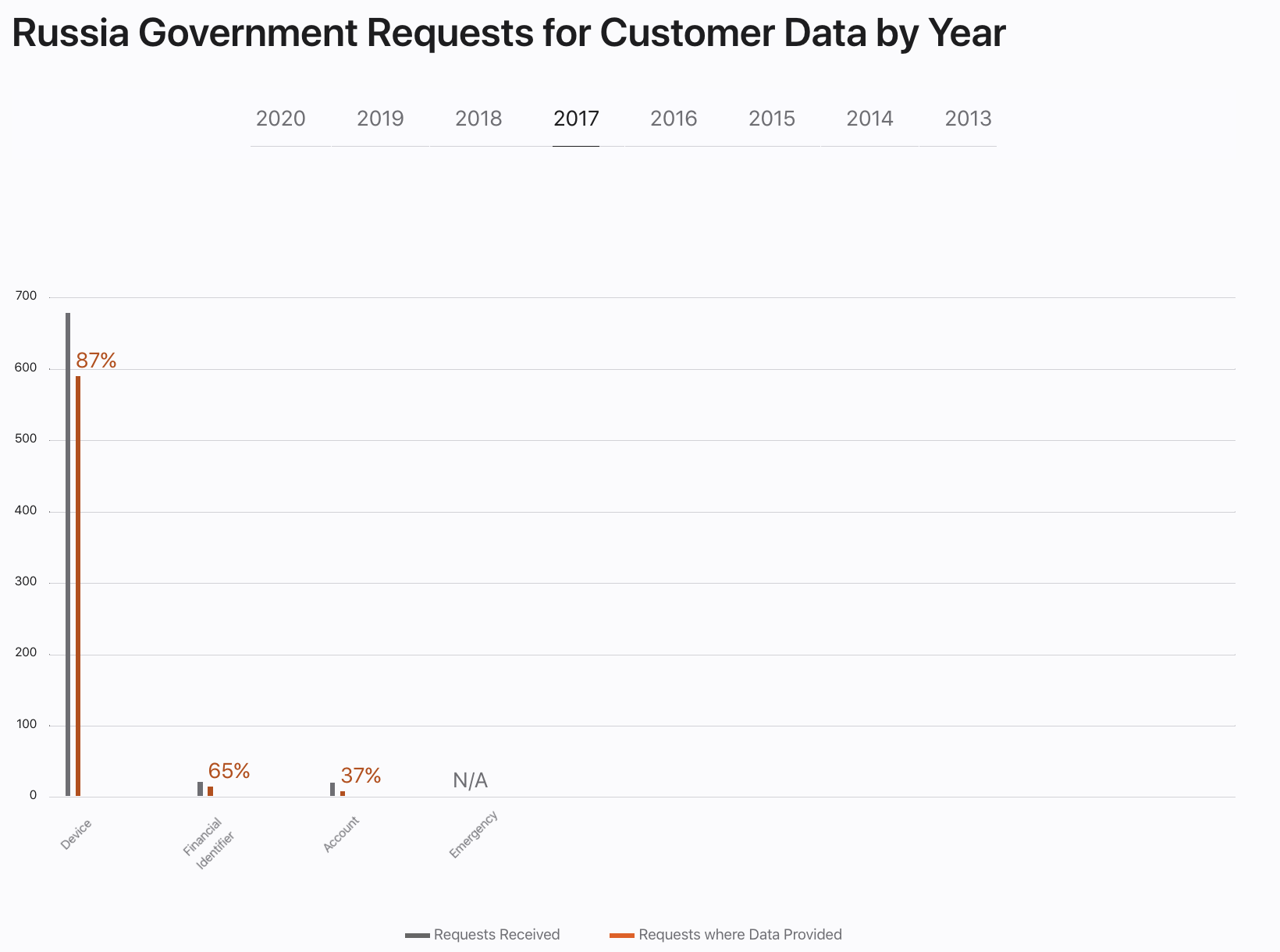
Russia Government Requests for Customer Data by Year - 2017
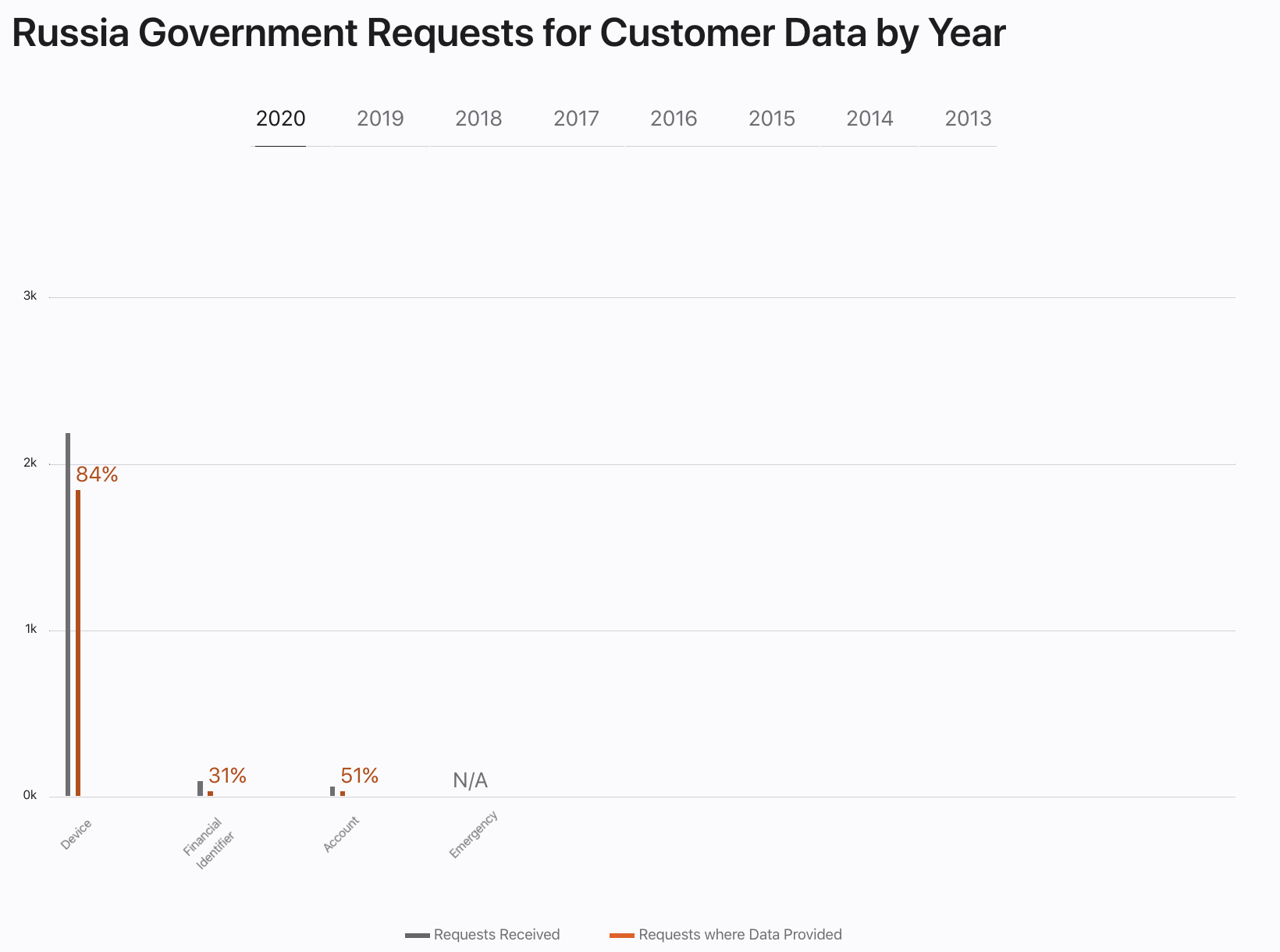
Russia Government Requests for Customer Data by Year - 2020
Apple’s data is presented in a misleading way, giving the impression that government requests and Apple’s compliance are decreasing over time. Source: https://www.apple.com/legal/transparency/ru.html
AppleCensorship analyzed Apple’s data and prepared its own charts showing trends over time and as it can be seen, both the requests and Apple’s compliance have increased exponentially over time.

Apple’s Compliance Rate
